How do we ensure that integration is just?

Photo by Robert Bye on Unsplash
In my last post, I discussed why understanding the economic realities of refugee resettlement is critical from a political standpoint. By embracing the economics of refugee resettlement, advocates can strengthen their case for helping displaced people. If we dig deeper into the data, we begin to understand that refugees face disadvantages during integration that we can address by embracing an economic argument. Even though refugees become net contributors in their host country, adults still rarely reach the same earning potential as their native-born peers. Newcomers must first learn the language, earn credentials, and gain experience before they can support themselves and their families. A host country, by understanding the economic reality of migrants, can help to mitigate this lost time.
Economics is very closely linked to justice. For refugees who enter the US before the age of 15, early language programming helps them to eventually achieve the same level of education as their native-born peers setting them up for a better financial future. Unfortunately, while adults do have high workforce participation, they, on average, never reach the same earnings level as their counterparts born in the US. By understanding this discrepancy, we see how integration policy should prioritize language learning and employment training to quickly enhance career prospects, especially for adults, to limit their lost time and build their earning potential.
This point seems an obvious one: if an immigrant can learn the language, then they can more easily find a job. But, this simple solution is complicated by several complexities. For instance, women in refugee families often elect to care for children while the men seek employment or attend language classes. Fewer women in the workforce may contribute to a refugee pay gap and less economic freedom. The goal of integration should be to give the same opportunities to each refugee regardless of their gender. A solution may be to expand access to childcare, giving women more freedom to engage in the workforce if they so choose.
Racial justice is also at stake. Refugees often seek out communities where they can be close to others of the same cultural background. This can create a so-called, and perhaps overemphasized, parallel society, where immigrants live and work within their social group and make little effort to integrate into the community as a whole. It may very well be a natural tendency for refugees to seek out a setting where they are comfortable, but doing so may put them at risk of disenfranchisement in their host countries. They may lack political representation, face higher rates of discrimination, and have less access to legal protections. Segregation of this kind leads to worse economic prospects for the marginalized group. But, the policies of the host country can actually reinforce this segregation, and have adverse effects; this complex topic, and it’s potential solutions, is one I will revisit in later posts.
Economic thinking can give refugees the best chance
Refugees and displaced people are some of the most vulnerable on Earth because they have been stripped of their means of self-sufficiency. Restoring a measure of economic self-sustainability is, therefore, a humanitarian imperative for wealthy countries when they resettle refugees. Those countries must pay close attention to the factors that contribute to hidden economic injustice, such as gender and ethnicity, or they will be completing only half of the job. Unfortunately, the global community is leaning away from supporting refugee migration and successful integration efforts that address these complexities go unnoticed. In this reality, examples of successful integration must be visible, and these examples must be presented within the big picture.
So let’s start worrying about the economics that matter: those that show that robust resettlement programs are possible and those that help migrants and refugees quickly reclaim their lost economic self-sufficiency. Wealthy countries can and should help refugees, but they must do so without losing sight of refugees’ humanity in the process. Economic policy crafted to serve people can ensure that integration is both just and fair, and increase prosperity for immigrants and native-born citizens alike.











